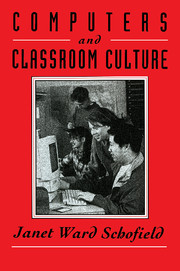Book contents
- Frontmatter
- Contents
- Acknowledgments
- 1 Introduction
- 2 The GPTutor: Artificial Intelligence in the Classroom
- 3 Computer Science 1: The Classroom and the Lab as Contrasting Learning Environments
- 4 Computers in the Closet: Attitudinal and Organizational Barriers to Computer Use in Classrooms
- 5 The Computer Room for Gifted Students: A (Bright, White Boys') Lunch Club
- 6 Girls and Computer Science: Fitting In, Fighting Back, and Fleeing
- 7 Computers, Classrooms, and Change
- Appendix
- References
- Author Index
- Subject Index
Appendix
Published online by Cambridge University Press: 06 July 2010
- Frontmatter
- Contents
- Acknowledgments
- 1 Introduction
- 2 The GPTutor: Artificial Intelligence in the Classroom
- 3 Computer Science 1: The Classroom and the Lab as Contrasting Learning Environments
- 4 Computers in the Closet: Attitudinal and Organizational Barriers to Computer Use in Classrooms
- 5 The Computer Room for Gifted Students: A (Bright, White Boys') Lunch Club
- 6 Girls and Computer Science: Fitting In, Fighting Back, and Fleeing
- 7 Computers, Classrooms, and Change
- Appendix
- References
- Author Index
- Subject Index
Summary
METHODOLOGY
The Research Team
In the past decade or so there has been increasingly wide acceptance of the idea that both the data generated in a research project and the conclusions drawn are to some extent influenced by the personal characteristics of the researchers involved, even in projects designed to minimize the impact of such characteristics (Phillips, 1990; Ratcliffe, 1983; Reinharz, 1992). For example, a researcher's disciplinary background clearly shapes the formulation of a problem, and researchers' gender and race often affect their access to certain kinds of information (Martin, 1978; Reinharz, 1992). Reactions to this realization have varied dramatically, especially among those engaged in the many forms of qualitative research. Some scholars, while acknowledging this situation, have sought to find ways to minimize its impact (Miles & Huberman, 1984). Others almost glory in it, arguing that this realization frees us from pernicious myths about objectivity (Roman & Apple, 1990). Although I am more closely aligned philosophically with the former position than the latter, I think it is useful for readers to know something about the background of those conducting the inquiry on which the book is based.
The core of the research team consisted of four individuals – the author of this book, who is a social psychologist; a postdoctoral fellow, who is an anthropologist; and two graduate students in social psychology. Three additional graduate students in anthropology participated either by conducting some of the student interviews or working on the content analysis of these interviews.
Information
- Type
- Chapter
- Information
- Computers and Classroom Culture , pp. 229 - 244Publisher: Cambridge University PressPrint publication year: 1995
